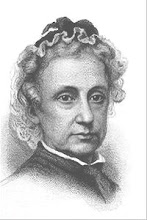
Now these Pilgrims, as I said, must needs go through this fair. Well, so they did; but behold, even as they entered into the fair, all the people in the fair were moved, and the town itself as it were in a hubbub about them; and that for several reasons; for--
First, The pilgrims were clothed with such kind of raiment as was diverse from the raiment of any that traded in that fair. The people therefore of the fair made a great gazing upon them: Some said they were fools, some they were bedlams, and some they are outlandish men.
Secondly, And as they wondered at their apparel so they did likewise at their speech, for few could understand what they said; they naturally spoke the language of Canaan, but they that kept the fair were the men of this world; so that, from one end of the fair to the other, they seemed barbarians each to the other.
Thirdly, but that which did not a little amuse the merchandisers, was, that these pilgrims set very light by all their wares, they cared not so much as to look upon them; and if they called upon them to buy, they would put their fingers in their ears and cry, 'Turn away mine eyes from beholding vanity,' and look upwards, signifying that their trade and traffic was in heaven.
From The Pilgrim's Progress, by John Bunyan
So Christian and his companion Faithful had to pass through this town where a fair was set up by Beelzebub, Apollyon and Legion. Need I elaborate? Certainly Bunyan wants to emphasize the world we have to travel through as pilgrims on our journey to the heavenly city. We HAVE to go through this world, which is heavily under the influence and power of Satan. There is no getting around it. But for true Christians, he fully captures it doesn't he? What was it about these pilgrims that upset the people in the town so much? About their clothing? About their speech? And notice the attitude which the pilgrims had towards the "wares" that were being sold at this fair.
Is all this true of you and me as we travel through Vanity Fair? Remember, if it is, the world is not going to love us. One point in particular: Please dear Lord, help me to speak the "language of Canaan."









